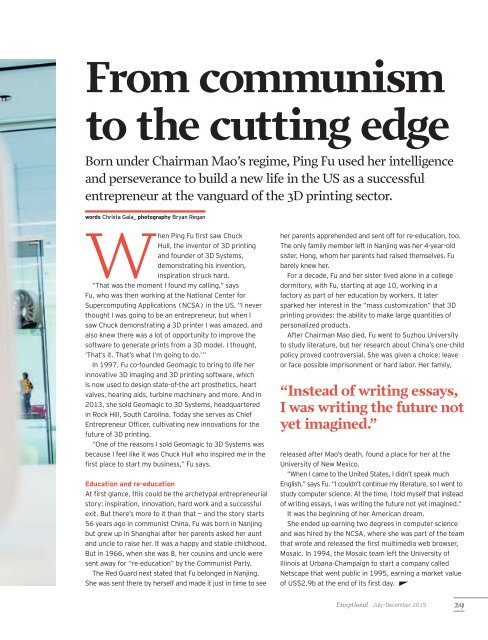Exceptional
Ua1bc
Ua1bc
Create successful ePaper yourself
Turn your PDF publications into a flip-book with our unique Google optimized e-Paper software.
From communism<br />
to the cutting edge<br />
Born under Chairman Mao’s regime, Ping Fu used her intelligence<br />
and perseverance to build a new life in the US as a successful<br />
entrepreneur at the vanguard of the 3D printing sector.<br />
words Christa Gala_ photography Bryan Regan<br />
When Ping Fu first saw Chuck<br />
Hull, the inventor of 3D printing<br />
and founder of 3D Systems,<br />
demonstrating his invention,<br />
inspiration struck hard.<br />
“That was the moment I found my calling,” says<br />
Fu, who was then working at the National Center for<br />
Supercomputing Applications (NCSA) in the US. “I never<br />
thought I was going to be an entrepreneur, but when I<br />
saw Chuck demonstrating a 3D printer I was amazed, and<br />
also knew there was a lot of opportunity to improve the<br />
software to generate prints from a 3D model. I thought,<br />
‘That’s it. That’s what I’m going to do.’ ”<br />
In 1997, Fu co-founded Geomagic to bring to life her<br />
innovative 3D imaging and 3D printing software, which<br />
is now used to design state-of-the art prosthetics, heart<br />
valves, hearing aids, turbine machinery and more. And in<br />
2013, she sold Geomagic to 3D Systems, headquartered<br />
in Rock Hill, South Carolina. Today she serves as Chief<br />
Entrepreneur Officer, cultivating new innovations for the<br />
future of 3D printing.<br />
“One of the reasons I sold Geomagic to 3D Systems was<br />
because I feel like it was Chuck Hull who inspired me in the<br />
first place to start my business,” Fu says.<br />
Education and re-education<br />
At first glance, this could be the archetypal entrepreneurial<br />
story: inspiration, innovation, hard work and a successful<br />
exit. But there’s more to it than that — and the story starts<br />
56 years ago in communist China. Fu was born in Nanjing<br />
but grew up in Shanghai after her parents asked her aunt<br />
and uncle to raise her. It was a happy and stable childhood.<br />
But in 1966, when she was 8, her cousins and uncle were<br />
sent away for “re-education” by the Communist Party.<br />
The Red Guard next stated that Fu belonged in Nanjing.<br />
She was sent there by herself and made it just in time to see<br />
her parents apprehended and sent off for re-education, too.<br />
The only family member left in Nanjing was her 4-year-old<br />
sister, Hong, whom her parents had raised themselves. Fu<br />
barely knew her.<br />
For a decade, Fu and her sister lived alone in a college<br />
dormitory, with Fu, starting at age 10, working in a<br />
factory as part of her education by workers. It later<br />
sparked her interest in the “mass customization” that 3D<br />
printing provides: the ability to make large quantities of<br />
personalized products.<br />
After Chairman Mao died, Fu went to Suzhou University<br />
to study literature, but her research about China’s one-child<br />
policy proved controversial. She was given a choice: leave<br />
or face possible imprisonment or hard labor. Her family,<br />
“Instead of writing essays,<br />
I was writing the future not<br />
yet imagined.”<br />
released after Mao’s death, found a place for her at the<br />
University of New Mexico.<br />
“When I came to the United States, I didn’t speak much<br />
English,” says Fu. “I couldn’t continue my literature, so I went to<br />
study computer science. At the time, I told myself that instead<br />
of writing essays, I was writing the future not yet imagined.”<br />
It was the beginning of her American dream.<br />
She ended up earning two degrees in computer science<br />
and was hired by the NCSA, where she was part of the team<br />
that wrote and released the first multimedia web browser,<br />
Mosaic. In 1994, the Mosaic team left the University of<br />
Illinois at Urbana-Champaign to start a company called<br />
Netscape that went public in 1995, earning a market value<br />
of US$2.9b at the end of its first day.<br />
<strong>Exceptional</strong> July–December 2015<br />
29









